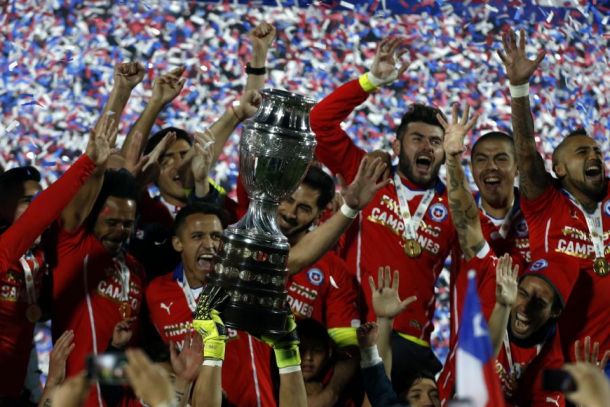SANTIAGO, CHILE -- The country of Chile can now rejoice. After 99 years since the inaugural Copa América, the oldest soccer tournament, La Roja have claimed a championship after defeating powerhouses Argentina in penalties.
Gonzalo Higuain of Argentina missed a penalty, Claudio Bravo saved an Ever Banega penalty, and Alexis Sánchez classily chipped home the fourth and final PK for Chile to emerge victorious.
This match was dead even through full and extra time, neither side giving an inch. But Jorge Sampaoli's men won the mental battle in the end, sinking all four penalties to defeat Sampaoli's home nation and bring a title to the host nation, which will be filled with, as Ray Hudson would say, 'hoochie coochie' in the bedrooms Saturday evening. There will be a certain baby boomer in Chile.
Argentina have now lost their second major FIFA cup final in a year, after losing to Germany in the 2014 World Cup. The drought for all major finals is now extended to six, the last win for La Albiceleste coming way back in 1993.
La Roja on the other hand, have finally brought well-deserved victory to their host country of Chile, a prestigious soccer nation who had been barren of a title in all their years, despite seeing the likes of Elias Figueroa and Marcelo Salas, among others. The question now is whether or not this current Chile squad is the best the nation has ever witnessed.
During regulation minutes, both teams did have their significant chances, but none more devastating than a last-second stoppage time breakaway led by Lionel Messi and Ezequiel Lavezzi. Messi laid it wide to Lavezzi, who struck a through ball in back right post for Gonzalo Higuain. Higuain made his one touch just in before the end line, but his attempt steered right into the wrong side of the net. And that is when the whistle was blown.
In extra time, the best chance was on a counterattack by Alexis Sánchez. Keeper Claudio Bravo of Chile had just made a catch save, and looked wide for Alexis, streaking down the right wing. Bravo's throw went in Sánchez's path, but Argentine defender Javier Mascherano looked to be in the way of thee the through ball. As Masche rose to meet the ball, it caromed beneath his legs and straight into the run of Alexis, who then had a 1-on-1. Pablo Zabaleta made a Herculean effort to retreat back and contest the shot from Alexis, which sailed just too high over the crossbar from the top right of the penalty area.
The regular time chances were few yet promising, starting with an Arturo Vidal volley in the 11th. Vidal turned and fired an overhead kick to the front right corner of the goal. Sergio Romero made a great dive to stop it.
Then there was a free kick by Argentina in the 20th minute. Messi whirled in a cross from wide of the right edge of the box, a short kick, which flew right into the path of Sergio Aguero, who turned and headed goalwards. Claudio Bravo stepped in and made a magnificent parry to save the scoreless affair for La Roja.
Five minutes later, Argentine attacker Angel Di Maria pulled up with what appeared to be an injury to his glute. In the 29th, Tata Martino was forced to use his first substitution and send on Lavezzi for Di Maria. That use of a sub proved costly later in the match, when Lavezzi and Mascherano both began limping due to pain of their own.
Just prior to half time in the 45th minute, Alexis had a crack at goal, where he tried a cheeky finesse shot from the left of the box. It looked to be on target, but keeper Romero was right there to prevent the score. Just a few ticks later, Javier Pastore fed Lavezzi on a breakaway, but his right footed shot went right at Bravo and was saved. Alexis had a chance on an overhead from an 82nd-minute Charles Aránguiz through ball, but his attempt disappointingly curved wide of the left side of the goal.
This defensively strong match definitely had its chippy moments as well, as 7 yellow cards were handed out, many rough challenges were made, and as a result, numerous players momentarily went down with injuries and cramps. But it all came down that 90th minuet chance for Higuain on the Lavezzi feed, and from the tough angle, the Napoli man blew it at a moment that defined the whole tournament championship. It spiraled downwards for Argentina from there.
Fatigue played a significant factor in extra time, as Chile were more strategic with their substitutions and still had one left by the time penalties came. Argentina used all of theirs in regulation, and therefore were unable to take off any of the multitude of players who came up limping or with cramps in the two extra periods.
Chile held on to excellent energy and fitness despite pressing the whole match, as the players were committed and would not let this opportunity slip away. Alexis Sánchez notably was a strong force pressing deep in La Albiceleste's defensive zone.
Claudio Bravo won the tournament's Best Goalkeeper award when along came the penalties, as his excellent job in net led Chile to an astounding 4-1 penalty result.
Matias Fernández stepped up for the first Chile penalty, and cannoned home his kick into the top left of the net. Lionel Messi matched with a creamer into the bottom right corner of the net despite the correct guess of Bravo.
Arturo Vidal came up next, shooting a slightly elevated strike towards the left side of the net. Sergio Romero got a hand on the shot, but frustratingly was unable to keep the PK from scoring.
Gonzalo Higuain has been the ultimate choker in clutch moments over the past few seasons for his club Napoli and for La Albiceleste, and he looked to redeem himself with his penalty try. But he skied his chance over the crossbar to give Chile the advantage. As soon as that shot missed, Messi evidently knew it was all over.
Charles Aránguiz put home Chile's third to increase the lead to 3-1. Bravo all but ended the game with a clutch save on Ever Banega's casual penalty to make Alexis Sánchez's attempt the winner.
Alexis stepped up and instead of powering home his try, sent a cheeky chip shot up the middle to swim the match, title, and tournament for La Roja. The 60,000 in Estadio Nacional waving their Chilean flags went bonkers, as did the players on the field.
Following the match, trophies and ribbons were given out. Argentina reluctantly accepted silver medals, looking in horror at the Copa América right in front of them as they had let another final match slip away.
Eduardo Vargas accepted the Golden Boot trophy on behalf of himself and Paolo Guerrero, the Peruvia man who tied Edu with a competition-high four goals. Bravo won the Best Goalkeeper award, and finally, lifted the Copa América on behalf of La Roja to seal the moment in Chilean and FIFA soccer history.
On a side note, Argentina are still looking for a win in a major final, now 22 years into their drought. Javier Mascherano has become the only player to ever lose four Copa America finals, and Lionel Messi again tastes bitter defeat in international play. Messi was in such distaste after the match that he supposedly rejected the award for the best performer of Copa América 2015. Instead, he and his Albiceleste teammates stormed to the locker room, again in utter dismay and exasperation.
Arturo Vidal was named Man of the Match after converting his penalty, getting multiple shots on goal (2 on goal, 5 shots total), and providing a key presence in the midfield for the underdog winners Chile.
Copa América, normally every four years, will return in just one year, as 2016 will be the centennial anniversary of this age-old tournament, started in Argentina itself in 1916. The 2016 competition will have 16 nations in participation, including the United States, a major country who declined to enter the 2015 Copa tournament in deference towards the North American Gold Cup.
Until next year, this has been Copa América 2015. Thanks for tuning in to VAVEL for all your coverage, and stay here for more coverage on a variety of sports and competitions in the United States and worldwide.
The CONMEBOL 2018 World Cup Qualifiers start this October, and the draw for fixtures will be on the 25th of July. So fans won't go too long without more South American soccer action.









































